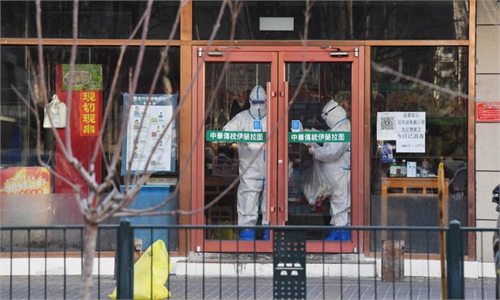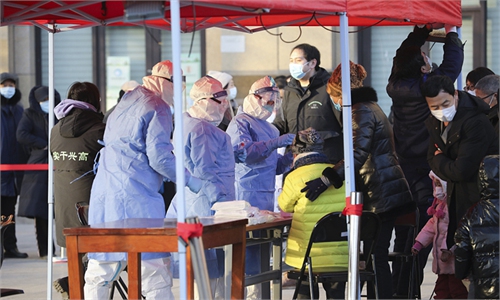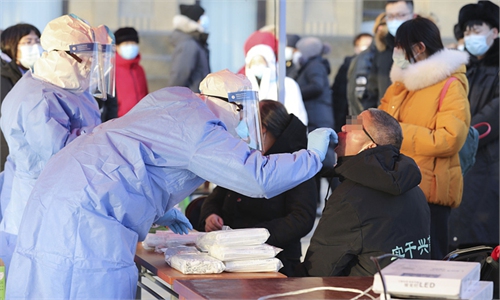Two Beijing districts begin all-member COVID-19 testing, a possible prelude for city-wide screenings

Beijing residents line up for nucleic acid testing in Xicheng district on Friday. Photo: Guo Zhimin/GT
Beijing announced on Friday that they are organizing nucleic acid testing for over 2 million residents in the city's Dongcheng and Xicheng districts from Friday to Saturday. Residents have said that the all-member testing campaign in these two core districts might act as a prelude to a city-wide nucleic acid testing campaign in the Chinese capital, especially as the Spring Festival holiday season approaches.
Since the recent surge in cases, infections have also been found in Xicheng District, said the Xicheng health authority, noting that they decided to conduct the all-member round of testing based on the recent increased risk of imported infections.
Xicheng district has arranged four rounds of nucleic acid testing for people in related industries as well as those who may have come into contact with the confirmed cases; but all the results from the tests came back negative.
Four out of 16 districts in Beijing have started all-member testing campaigns since the latest surge first began in late December. Two districts, Daxing and Shunyi, have already completed their all-member screenings, and most subdistricts in Tongzhou district announced they will carry out nucleic acid testing campaigns.
"I received the testing massage on Friday morning and then booked the test on my phone," a Xicheng resident surnamed Guo, told the Global Times.
According to Guo, the booking process is simple: she only had to fill her information out using the WeChat widget named "Beijing Health" and will receive a QR code and the location of a nearby testing site.
The Global Times found that after the early hours of the morning, long lines formed at many testing sites in both Dongcheng and Xicheng districts, but testing will continue until 9 pm in the evening for residents' convenience.
"Volunteers are on hand to keep order and they're asking people to stay a meter away from each other when queuing," Guo said.
To speed up the screening and testing, the Global Times learned that Xicheng will employ the "batch testing" method, which involves combining 10 throat swabs from residents and testing them together rather than individually.
Beijing reported three new confirmed cases and one asymptomatic carrier on Thursday, with two imported silent carriers.
The Global Times learned that Haidian may be another district that will conduct all-member testing after a new case in Daxing district was found to have been to Haidian, where over a dozen universities are located.
Yang Zhanqiu, deputy director of the pathogen biology department at Wuhan University, told the Global Times on Friday that sporadic cases in Beijing will not result in widespread transmission of the coronavirus or be serious enough to require city-wide testing.
However, Beijing's caution is understandable given it is China's political center, and the flow of people within the city is expected to increase as the Spring Festival approaches, Yang said.
People flows in Beijing involve multiple different districts; if some districts conduct nucleic acid testing while others do not, the overall effectiveness of some districts' screenings may be reduced. Based on this, a city-wide testing campaign should not be ruled out as an option, Yang said.




